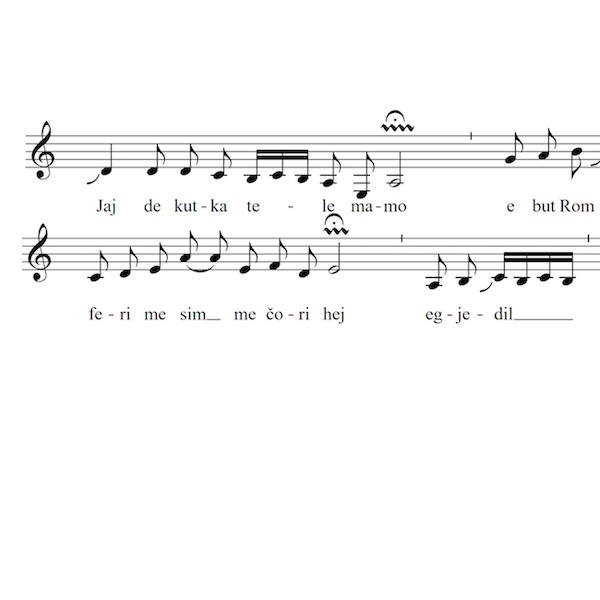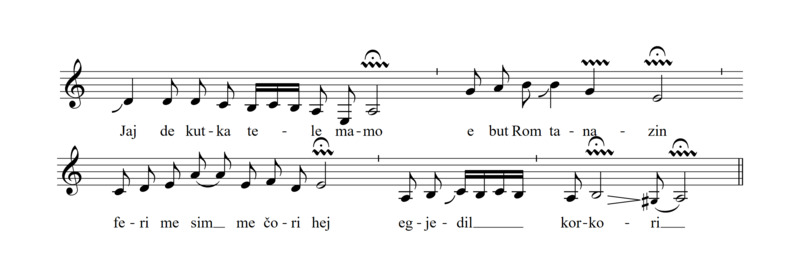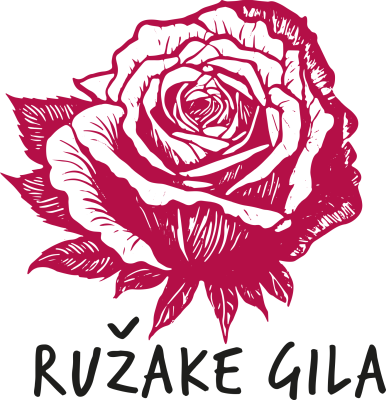
Kutka tele, mamo, e but Rom tanazin hej
- Genre
- langsames Lied
- Thema
- Klagelied
- DOI
- doi.org/10.21939/prew-t991
Content
Recordings
Kutka tele, mamo, e but Rom tanazin hej is the lament of a man who feels lonely and longs for companionship, which is described as being more valuable than money. He expresses longing for his homeland. The recording was made during a field research interview in 1992 at the Nikolić family home and was also published in 2016 on record Treasures of Fieldwork: Music from Minorities. Selected Field Recordings by Ursula Hemetek.
musical transcription
Ethnomusicologist Christiane Fennesz-Juhasz comments on Kutka tele, mamo, e but Rom tanazin hej:
[It was] her father’s [Ruža Nikolić-Lakatos's father] favourite tune. By means of poetic images and metaphorical expressions, and of course in the first person, this song deals with loneliness and grief. It is a characteristic feature of the loke gjila, sung parlando rubato, that they are created anew each time when interpreted; in the four-line stanzas the tones between the constant skeleton tones can slightly vary, and the lyrics are flexible in so far as, according to the performance situation and mood of the singer, verses can be added, omitted or rearranged, or their text altered a bit – all of which occurs in this example. The singer concludes her performance, as is customary in this musical practice, with a dedication to the listener (spoken formula in Romani. All in your honour, Uschi!)”. (p. 45)
Source and further information:
- Pietsch, Rudolf, Marko Kölbl, and Hande Sağlam, eds. Tondokumente zur Volksmusik in Österreich, Vol. 8 / Sound Documents of Folk Music in Austria, Vol. 8. Feldforschungsschätze zur Musik von Minderheiten: Ausgewählte Feldaufnahmen von Ursula Hemetek / Treasures of Fieldwork on Music and Minorities: A Selection of Ursula Hemetek's Field Recordings. Wien, 2016. CD.
Ruža Nikolić-Lakatos sings Kutka tele, mamo, e but Rom tanazin hej. The recording was made in 1960 by Mozes F. Heinschink in the Lakatos family caravan at Ringelseeplatz in Vienna-Floridsdorf. It is one of the singer’s earliest recordings. Compared to later recordings, it is remarkable that the beginning only consists of improvised syllables leading into the song, preparing the mood.
Commentary
(GERMAN ONLY) Ruža Nikolić-Lakatos explains to ethnomusicologist Ursula Hemetek how important Kutka tele, mamo, e but Rom tanazin hej is to her during a field research interview. She associates it with her father, who always whistled it, and dedicates the song to the researcher.
Lyrics
Stanza 1
| Jaj de kutka tele, mamo, | Down there, mother, |
| e but Rom tanazin, | the many Roma are camped, |
| feri me sim de čori hej | only I am miserable, |
| egjedil, korkori. | lonely and alone. |
Stanza 2
| Jaj de lašo-j inke o Del, | But God is good, |
| vi ma žutija o Del, | God will help me too, |
| kero inke de vi me hej | I will also be the one |
| e phralengi voja. | who brings the brothers joy. |
Stanza 3
| Jaj de voja, bukurija | Joy, pleasure |
| kerel šel ezera, | is worth a hundred thousand, |
| kerel šel ezera hej | is worth a hundred thousand, |
| maškar muro nipo. | in the midst of my family. |
Stanza 4
| Haj de so kero ma, Devla, | What should I do, oh God, |
| kaj šo muro šero, | where should I lay my head, |
| bare čorimaske hej, | because of the great misery, |
| la bara brigake? | because of the great sorrow? |
Stanza 5
| Jaj de čoro sim me, mamo, | I am poor, mother, |
| čoro taj korkoro, | miserable and alone. |
| naj ma khonik de, mamo, hej, | I have no one, mother, |
| ko pašа matoro. | no one is with the drunkard. |
Stanza 6
| Ke voja, bukurija | For joy, pleasure |
| kerel šel ezera, | is worth a hundred thousand, |
| kerel šel ezera hej, | is worth a hundred thousand, |
| ando taršošago. | in company. |
Stanza 7
| Sa tja patjivake, Uschi! | All in your honour, Uschi! |
Zitierempfehlung anzeigen
Bitte zitieren Sie diese Seite wie folgt:
Music and Minorities Research Center, "Kutka tele, mamo, e but Rom tanazin hej", Ružake gila, zuletzt besucht am Loading date..., doi.org/10.21939/prew-t991


